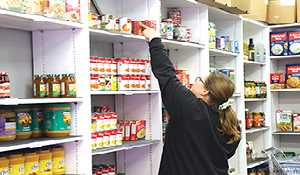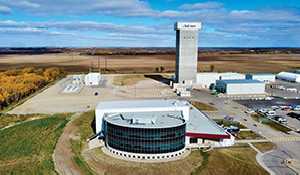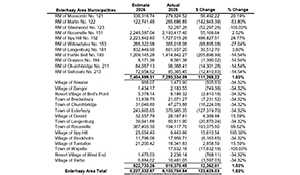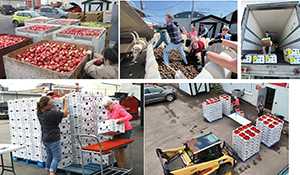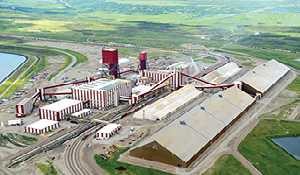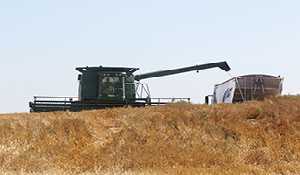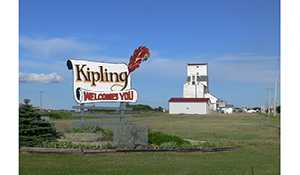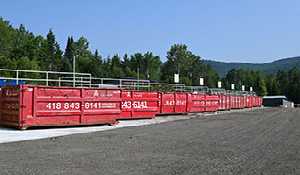Young calls Sask ‘energy superpower’ during event in Belle Plaine, government, industry call for increased rail capacity
July 21, 2025, 4:10 pm
Ryan Kiedrowski, Local Journalism Initiative Reporter

In the mining world, Saskatchewan has a lot to brag about, and the provincial government is saying the province is poised to make Canada an energy and mining superpower.
Fresh off an Energy and Mines Ministers Conference in Prince Edward Island, Colleen Young realized exactly how Saskatchewan is leading the way for growth across Canada.
“I was proud to discuss how innovative Saskatchewan is in our energy and resource sectors,” said the provincial Energy and Resources Minister. “Ministers from across the country explored how addressing the challenges in the resource sectors can serve as opportunities for growth nationwide. The largest takeaway for me was that it is clear that Saskatchewan is leading the charge in many of these areas. A major focus of this meeting was on the need to build a strong, secure and competitive resource sector across Canada, and from a Saskatchewan perspective, we are in a great position to help manage that change.”
Front and centre for Young was seeking federal support for transportation.
“I advocated for substantial federal investment in building national energy infrastructure and corridors to transport reserves resource products to tide water,” she said. “I also emphasized the need for streamlined and predictable approval of large resource projects to attract investment from development countries and to ensure Canada’s supply chains remain secure and reliable.”
Of the talks in PEI, Young noted they paved the way to find ways to not only promote Saskatchewan on a greater scale, but “how we can make Canada an energy and minerals superpower.”
“It was refreshing to feel the unity in those discussions, which I’m hopeful will lead to more access for Canadians to reliable, affordable energy and wealth generated by our vast resources,” Young said. “With Saskatchewan’s robust and expanding resource sectors, we are and have been positioning the province to contribute significantly to Canada’s emergence as a global energy superpower.”
Highlighting the importance of mining in the province, Pam Schwann, President of the Saskatchewan Mining Association, broke down some interesting numbers.
“The mining sector continues to be one of Saskatchewan’s pivotal economic drivers, directly employing over 11,000 people with an annual payroll of over $1.7 billion, consistently ranking among the province’s top contributors to GDP and direct government revenues,” she said. “In 2024, Saskatchewan’s mining industry purchased over $3 billion in goods and services from Saskatchewan businesses, including over $900 million from Indigenous-owned businesses. In 2025, Saskatchewan mining companies will make over $7 billion in capital investments with our exploration members contributing over $425 million annually to discover new deposits.”


A tour of Belle Plaine
Young and Schwann were among a group of dignitaries invited to a quick tour of the Mosaic Belle Plaine potash solution mine last week, giving industry leaders the opportunity to highlight some of the triumphs and challenges facing the energy sector in Saskatchewan.
“Potash is one of Saskatchewan’s 27 critical minerals, and we at Mosaic would say it’s the most critical as it is essential to helping the world grow the food it needs,” said Marnel Jones, Director of Government and Public Affairs for The Mosaic Company.
“Our facility here at Belle Plaine has been producing potash for over 60 years. Mosaic’s approximately 500 employees at this site and 2,000 province wide are foundational to the Saskatchewan mining story.”
The first and largest solution mine in the world, the Belle Plaine facility produces nearly three million tonnes of finished potash products annually.
Is mining immune to tariffs?
When pressed for her opinion on what the uncertainty of U.S. tariffs might have in store for the mining industry, Young noted those discussions are best left to the federal government.
“The meetings that we had last week in PEI, we did discuss tariffs a little bit, but for the most part, we were focused on energy and making Canada a superpower,” she said. “I will leave the counter tariffs under discussion to our prime minister and his cabinet as to what they would want moving forward.”
According to Jones, it’s more of a ‘wait and see’ process right now.
“We’ve been advocating for our potash industry on both sides of the border,” she said. “As you know, we have operations both in the U.S. and Canada. With our potash operations here in Canada, we have been watching the trade negotiations closely—as have has everyone—and it’s continuing to be a dynamic situation. So we’re watching to see what happens next. Right now, we’re fortunate that our product is all CUSMA compliant, so we are not experiencing any tariffs, and we’re going to continue to advocate for that to be the case. We don’t believe that any fertilizer product should be tariffed as it’s meant for humanitarian services to grow food, and we’re going to continue to be pushing for that.”
Jones noted that potash prices are stable right now, despite what may be happening at a global level.
“That’s where we like them to be,” she said. “It’s in a stable place, not what we saw back in the period when Ukraine was invaded by Russia. We saw sky high potash prices, and that’s not actually very conducive to the market or to producers in the long term. So the market we have right now, it’s stable. We’re making lots of tonnes, and our customers want it. So we’re in a pretty good spot today.”
Increased costs are one area Schwann is keen to keep her eyes on as tariff threats continue to run hot and cold.
“You have some products that cross over like automobiles, but steel products that might go into the States and come back and can get increased costs from that,” she said. “So if you’ve got large capital projects that are happening, you’re going to see some price escalation, and that may actually stop those projects moving forward. We’re watching it very closely, obviously it’s a concern. We like to see free trade, especially amongst our allies.”

Moosomin Food Bank providing families with Christmas hampers
The Moosomin Food Bank is supporting Moosomin and surrounding communities with up to 90 hampers helping families over the holidays. Samantha Campb...

